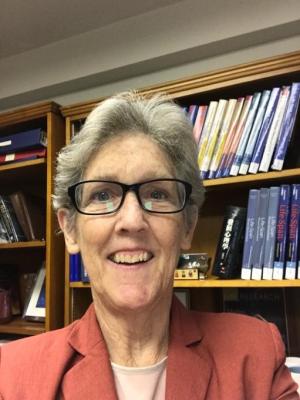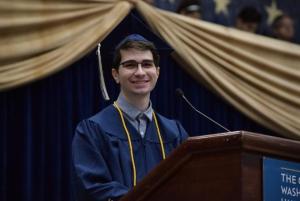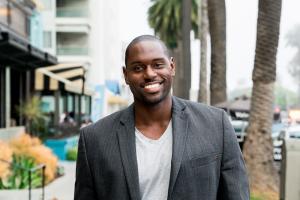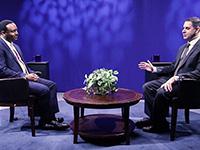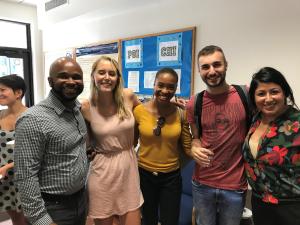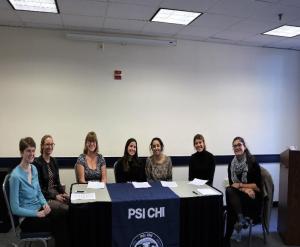Department News, Fall 2017
Message from the Chair
Department Spotlights
Department Announcements
Alumni Updates/Class Notes
Donor Recognition
Message from the Chair
Another year gone by—and another Department of Psychological and Brain Sciences newsletter full of faculty, students, alumni and their achievements to share with you. This past year, the faculty completed an analysis of where we are as a department and where we want to go. The plan addressed everything from how we can increase support for our doctoral students to what to do about poor old Building GG (which many feel is unworthy of its wonderful occupants).
The wishes of a recent BA graduate meshed perfectly with another part of our strategic plan (see “Anonymous Donor” story below). We are currently plotting how to use her generous gift to enhance undergraduate research and community service internship opportunities—hands on, skill-building experiences that will better position students for careers in research or professional practice. As part of the initiative, we will also add more career-related content to courses and offer more specialized career advising sessions. Notable here is a small Engaged Liberal Arts grant awarded this year by Columbian College to Drs. Cindy Rohrbeck and Christina Gee. They will use it to beef up career-preparation activities in Psyc 3170, Clinical Psychology—with help from the GW Career Center.
Another part of our strategic plan focuses on engaging our colleagues, alumni, and friends. Last spring, we launched a new departmental Moffuium series that will draw prominent psychologists to campus to give talks and meet with faculty and students. By inviting local alumni to these events and reaching out to alumni in other new ways, we hope to involve more of you in our activities and in the development of our students. So please read on…
Department Spotlights
PAUL SCOTTI, BA '17, RECOGNIZED AS CCAS DISTINGUISHED SCHOLAR
We are especially proud of Paul Scotti, BA 17, a recent graduate from the Psychological and Brain Sciences department who was recognized with one of two Columbian College of Arts and Sciences Distinguished Scholar awards for his undergraduate accomplishments. As an undergraduate researcher mentored by Dr. Sarah Shomstein, Paul was an integral part of GW’s cognitive neuroscience community and presented his work at multiple scientific conferences. He gave a superb talk at the CCAS Commencement Ceremony and is now pursuing doctoral study at Ohio State University. GW doctoral students Mehrit Tekeste and Michelle Kramer interviewed him about his time at GW, current research and next steps:
How did you first get interested in psychology research?
Back in high school I often spent my free time reading pop psychology books, and it always interested me how the brain basically defines who we are and yet even basic questions of cognition have not been fully answered. So going into GW I knew that I wanted to pursue something related to this—I took biology, chemistry and psychology classes as a freshman and realized that I was most driven to look into the basic mechanisms behind psychological processes. So with that general motivation I sought out a research lab relevant to my interests.
How did your experiences at GW prepare you for what you are doing now?
What I am doing right now is very similar to what I was doing back at GW—formulating ideas, discussing topics with colleagues, programming, etc. Joining a research lab early on was monumental in developing my vague interests as a freshman into an actual passion for the field.
What was your favorite memory of your time in the Psychological and Brain Sciences Department at GW?
My favorite memories are relaxing at the end of the day by getting some food and drinks and playing board games with the other people in the Psychological and Brain Sciences Department.
What have you been doing since graduation? Can you give us a glimpse of what you are working on currently?
Currently, I am excited to start up two new experiments! With Dr. Julie Golomb, in her Vision and Cognitive Neuroscience Lab, I am hoping to start running participants in a study which investigates the mechanisms behind how the brain achieves a stable perception of our visual world across eye movements; specifically, how this process differs when we have a specified amount of time to initiate an eye movement to a known spatial location versus when we are suddenly instructed to move our eyes to a newly defined spatial location. With Dr. Andy Leber in his Cognitive Control Lab, I am setting up a project, which examines how aspects of long-term memory representations may be selectively and unconsciously altered due to task-irrelevant information.
ALUMNA GIVES BACK: $25,000 GIFT TO ENRICH GW PSYCHOLOGY UNDERGRADUATE EXPERIENCE
One of our alumni generously donated $25,000 to the Psychological and Brain Sciences Department last spring. The alumna, who asked to remain anonymous, graduated from GW with a bachelor’s degree in psychology a couple of years ago and is now working with children who need support and planning to go on for a degree in clinical psychology. In a phone conversation with the department chair, Dr. Sigelman, our generous donor talked of her desire to “give back” and hope that we could do more to advise majors earlier in their academic careers about options after graduation and better prepare for them for the various options. A faculty committee has been formed and is working with Dr. Sigelman to decide how to allocate the funds, through the initiative they have tentatively dubbed Promoting Undergraduate Preparation in Psychology (PUPP). Options include summer research fellowships, funding for student pilot projects, research-related travel awards, support for service internships, career advising workshops and other initiatives to help students develop skills and prepare for careers in psychology. The GW Psychological and Brain Sciences Department is incredibly grateful for our anonymous donor’s kind support, which will enhance the academic experiences and careers of many GW undergraduates.
FROM DR. PHILBECK'S LABORTATORY
In this photo, graduate student Lindsay Houck demonstrates the use of their shutter window, which is part of a project that graduate and undergraduate students are collaborating on in Dr. Philbeck’s laboratory investigating distance perception and navigation. In the GW Psychological and Brain Sciences Department, undergraduate students have the opportunity to both conduct and participate in research as members of multidisciplinary teams supervised by leading scientists. The new gift will further support undergraduate research training opportunities.
GUIDING TROUBLED TEENS
At a juvenile detention center inside New York’s notorious Rikers Island prison, Isaiah Pickens, BA ’05, faced what he would look back on as a pivotal moment in his young career.
A PhD student with aspirations to become a clinical psychologist, the former Columbian College psychology major volunteered as a counselor for young people caught up in the juvenile justice system. Within the prison walls, he sat among a semi-circle of folding chairs, talking to a group of African American teenagers about the traumas in their lives.
Pickens listened as the teens told stories about how they ended up in Rikers—from run-ins with the police to violence in their homes. He nodded empathetically and encouraged them to stay positive. This place, he told them, didn’t have to be their destination.
But not all the teens bought Pickens’ message. “Come on,” one young man challenged him. “You don’t really believe that.”
Pickens instantly understood his meaning: “From one black male to another, he was saying he saw right through me,” he said. “I must have convinced him that I believed what I was saying, because then he called me out as not really being black.”
That moment—a young man behind bars challenging his identity as an African American—stayed with Pickens, who, today, is a renowned psychologist, a frequent media voice in defense of the underserved and underprivileged and the host of a TLC reality show. But after the showdown in Rikers, he seriously doubted whether he should continue on his professional path. Could he really look young black men in the eye, surrounded by prison guards, and tell them not to lose hope?
“I knew if I was going to choose this career and remain true to my cultural heritage, I’d have to find a way to be a bridge,” he said. “I’d have to find a way to show young people that I wasn’t giving up on them—and provide them with a reason not to give up on themselves.”
Perseverance and passion are two qualities Pickens has never lacked. A gifted high school student, he earned a full-tuition Stephen Joel Trachtenberg Scholarship and enrolled at GW as a 16-year-old freshman. Soon after, he landed a spot on GW’s basketball team and, as a theatre minor, played a role on the HBO series The Wire while still an undergraduate. His academic focus garnered him a Gamow Research Fellowship and a research assistant position in Associate Professor of Clinical/Community Psychology Christina Gee’s lab. “Isaiah is fearless, naturally curious and has a sense of openness to new experiences,” Gee said. “If there is a challenge out there, he’s willing to take it.”
After graduating from GW, Pickens initially planned to pursue careers as both an actor and a psychologist. It didn’t take long, he said, to learn that “you can’t go on auditions and get your PhD at same time,” he said. But after earning his doctoral degree at Fordham University, Pickens was determined to combine psychology and entertainment as a means of reaching a broad audience. He created iOpening Enterprises, a multi-media company that promotes accessible health messages to young people through books, film and life skills workshops. He is a regular contributor to Psychology Today, HuffPost and BlackDoctor.org, and he has appeared in national media outlets to discuss the psychological implications of current events as they relate to trauma and mental health issues.
Recently Pickens became the co-host of a new TLC reality show called The Spouse House, which pairs seven single men and seven single women in one house to find long-term relationships. Pickens counsels the couples as they face the weekly prospect of either accepting a proposal or being evicted from the house.
“It’s not what I ever pictured myself doing,” Pickens laughed. “My life’s mission is to help develop the healthiest versions of people. But I also like to think outside the box.”
Voices to Honor
As a D.C. native attending the School Without Walls, Pickens jokes that he grew up literally across the street from the GW Psychological and Brain Sciences Department. The son of educators—his father was a vice principal, his mother a social worker—his parents’ example fostered a passion to help young people meet their goals. For Gee, Pickens’ enthusiasm in the lab and the classroom was nothing short of infectious. “Isaiah stood out immediately,” said Gee. “He was truly inquisitive, and I saw a great deal of potential in him.”
Through his varied professional roles—Pickens is also affiliated with UCLA-Duke National Center for Child Traumatic Stress and the coordinator of the online National Child Traumatic Stress Network—he’s traveled across the country to schools, jails and foster care agencies, working with young people on understanding the impact of life stress and trauma. The author of a book on understanding the pressures on young people (The Dawn of Generation Why), Pickens says he frequently hears teens express concerns about social justice, cyber bullying and suicide. He is struck by the fact that these young people are often more willing than adults to admit racial and cultural biases—and talk about ways to confront them.
“One of the things that’s difficult for people to come to terms with is that we’re all biased in some way,” Pickens said. “The way to deal with biases is to acknowledge them and face them in the light of day.”
But too often, he said, teens’ opinions are brushed aside by even well-meaning adults—a generational bias that Pickens advises parents and teachers to address. “So many adults are so intent on showing they are in charge that they don’t fully listen to what young people have to say,” he noted. “And, believe me, young people are saying things that are worth honoring.”
Postscript: Dr. Pickens was recently selected as a Robert Wood Johnson Foundation Culture of Health Leader and Fellow, 2017 cohort. This highly selective program aims to create the next generation of health leaders in America. Congratulations!
This article originally appeared in the CCAS Spotlight newsmagazine.
Department Announcements
IN MEMORIUM
We are sad to announce that Pamela Woodruff, who taught in the Psychological and Brain Sciences Department for many years, died recently after a brief hospitalization. Pamela taught hundreds of students over the years in her very popular course on Death and Dying. She retired from teaching in May 2016, and was featured in an article in The Hatchet. We appreciate all her years of service to the department and express our deepest condolences to her family.
There is a memorial service set for December 16 at 2 p.m. at 17715 Meeting House Road in Sandy Springs, MD.
In lieu of flowers, donations can be sent in Pamela's name to Candlelighters, an organization she helped start that supports families of children with cancer.
FACULTY KUDOS
| Faculty from all three psychology programs on the steps of Gelman Library. From left: Row 1 (top): Paul Poppen, Phil Moore; Row 2: Myeong-Ho Sohn, Guangying Wu, Dwight Kravitz; Row 3: Sarah Calabrese, Sarah Shomstein, Steve Mitroff, Dennis Schell; Row 4: George Howe, Sharon Lambert, Tonya Dodge, Peg Barratt, Carol Sigelman, Sherry Molock; Row 5: Cynthia Rohrbeck, Christina Gee, Jody Ganiban, Huynh-Nhu (Mimi) Le, John Philbeck. Not pictured: Lisa Bowleg, Risa Broudy, Stephen Dopkins, Larry Rothblat, Michelle Stock, Maria Cecilia Zea. |
FACULTY MAKING NEWS!
Sarah Calabrese: Condoms and the double standard in prescribing PrEP
Steve Mitroff: Video Conversation with Dean Vinson
Sherry Molock & George Howe: Holiday Depression
New Grant! John Philbeck is a co-investigator of a new five-year R01 grant from the National Institutes of Health. The grant aims to enhance training of pediatric residents learning how to perform a difficult neonatal intubation procedure by using computer simulation and automated evaluation mechanisms.
Guest Editor! George Howe was invited to guest edit a supplemental issue of Prevention Science entitled “Differential Benefits of Programs for Preventing Adolescent Depression.” This is a major product of the National Institutes of Mental Health (NIMH) grant he has been working on over the past five years.
Election to Elite Research Society! Sarah Shomstein was elected to the International Neuropsychological Symposium, an invitation-only research society. The International Neuropsychological Symposium (INS) was founded by Henry Hécaen in 1951 and has maximally 124 members worldwide. Members are elected on the basis of their contributions to the field of cognitive neuroscience.
Select Faculty and Graduate Student Publications This is just a sample of all of the great work we published as a department over the past year! Faculty names are bolded and student names are denoted with asterisks.
- *Aguayo-Romero, R.A., *Alizaga, N.M., & Glickman, C. (2016). “The dynamics of intersectionality and gender affirmation on HIV risk among transgender IPV survivors. “Psychology and AIDS Exchange Newsletter.
- *Barnett, A.P., Ruiz, M.S., & Zea, M.C. (2016). “Transgender adolescents and transactional sex.” In S. Vaughn (Ed.), Transgender youth: Perceptions, media influences, and social challenges (pp. 67-95). New York, NY: Nova Science Publishers, Inc.
- Bowleg, L., del Rio-Gonzalez, A., *Holt, S., Perez, C., Massie, J., Mandell, J., & *Boone, C. (2017). “Intersectional epistemologies of ignorance: How behavioral and social science research shapes what we know, think we know, and don't know about US black men's sexualities.” Journal of Sex Research, 54(4-5), 577-603. doi:10.1080/00224499.2017.1295300
- Calabrese, S. K., Magnus, M., Mayer, K. H., Krakower, D. S., Eldahan, A. I., Hawkins, L. A. G., Dovidio, J. F. (2017). “’Support your client at the space that they're in’: HIV pre-exposure prophylaxis (PrEP) prescribers' perspectives on PrEP-related risk compensation.” AIDS Patient Care and STDs, 31(4), 196-204. doi:10.1089/apc.2017.0002
- Ericson, J.M., Kravitz, D.J., & Mitroff, S.R. (2017). “Visual search: You are who you are (+ a learning curve).” Perception.
- Dodge, T., Clarke, P., & Dwan, R. (2017). “The relationship between physical activity and alcohol use among adults in the United States: A systematic review of the literature.” American Journal of Health Promotion, 31(2), 97-108. doi:10.1177/0890117116664710
- Dopkins, S., Varner, K., & *Hoyer, D. (2017). “Variation in the standard deviation of the lure rating distribution: Implications for estimates of recollection probability.” Psychonomic Bulletin and Review, 1-7. doi:10.3758/s13423-017-1232-9
- Eisenberg, M.H., Phillips, A.L., *Fowler, L.A., & Moore, P.J. (2017). “The impact of e-diaries and accelerometers on young adults' perceived and objectively measured physical activity.” Psychology of Sport & Exercise, 30, 55-63.
- *English, D., Lambert, S. F., & Ialongo, N. S. (2016). ”Adding to the education debt: depressive symptoms mediate the association between racial discrimination and academic performance in African Americans.” Journal of School Psychology, 57, 29-40.
- *Fowler, L.A., *Holt, S., & *Joshi, D. (2016). “Mobile technology-based interventions for adult users of alcohol: A systematic review of the literature.” Addictive Behaviors, 62, 25-34.
- Friedman, S.L., Sigelman, C.K., Rohrbeck, C.A., and del Rio-Gonzalez, A.M. (2016). “Quantity and quality of communication during parental deployment: Links to adolescents’ functioning.” Applied Developmental Science.
- Grant, K. E., Tandon, D., Lambert, S., Farahmand, F. K., Ross, K., Odahl-Ruan, C., & Tolan, P. (2017). “Community psychology approaches to intervention with children and adolescents.” In M.A. Bond, I. Serrano-Garcia, C.B. Keys, & M. Shinn (Eds.), APA handbook of community psychology: Methods for community research and action for diverse groups and issues (pp. 587-603). Washington, DC: American Psychological Association.
- *Hagerman, C.J., Bellini, P.G., Davis, K.M., Hoffman, R.M., Aaronson, D.S., Leigh, D.Y., Zinar, R.E., Penson, D., Van Den Eeden, S., & Taylor, K.L. (in press). “Physicians' perspectives on the informational needs of low-risk prostate cancer patients.” Health Education Research.
- *Hearing, C.M., Chang, W.C., Szuhany, K.L., Deckersbach, T., Nierenberg, A.A., & Sylvia, L.G. (2016). “Physical exercise for treatment of mood disorders: A critical review.” Current Behavioral Neuroscience Reports, 3(4), 350-359.
- Howe, G. W. (2017). “Preventive effect heterogeneity: Causal inference in personalized prevention.” Prevention Science. doi:10.1007/s11121-017-0826-9
- Massey, S., Reiss, D., Neiderhiser, J., Leve, L., Shaw, D., & Ganiban, J. (2016). “Maternal personality traits associated with patterns of prenatal smoking and exposure: Implications for etiologic and prevention research.” Neurotoxicology and Teratology, 53, 48-54. doi:10.1016/j.ntt.2015.11.010
- Le, H. N., Hipolito, M. M. S., Lambert, S., Terrell-Hamilton, F., Rai, N., McLean, C., Nwulia, E. (2016). “Culturally sensitive approaches to identification and treatment of depression among HIV infected African American adults: A qualitative study of primary care providers’ perspectives.” Journal of Depression & Anxiety, 5(2), 223.
- Lee, D., Shin, H. J., Weldon, R. B., & Sohn, M. (2016). “Cross-cultural differences in consistent mapping effects of targets and distractors.” Journal of Cross-Cultural Psychology, 47(4), 525-539. doi:10.1177/0022022116631823
- Liu, C., Goparaju, L., *Barnett, A., Wang, C., Poppen, P., Young, M., & Zea, M. C. (2017). “Change in patterns of HIV status disclosure in the HAART era and association of HIV status disclosure with depression level among women.” AIDS Care - Psychological and Socio-Medical Aspects of AIDS/HIV, 1-7. doi:10.1080/09540121.2017.1307916
- *Ryan, M.T., Rohrbeck, C.A., Wirtz, P.W. (in press). “The importance of self-efficacy in parental emergency preparedness: A moderated mediated model.” Disaster Medicine and Public Health Preparedness.
- *Saleem, F. T., *English, D., *Busby, D. R., Lambert, S. F., *Harrison, A., Stock, M. L., & Gibbons, F. X. (2016). “The impact of African American parents’ racial discrimination experiences and perceived neighborhood cohesion on their racial socialization practices.” Journal of Youth and Adolescence, 45(7), 1338–1349. doi: 10.1007/s10964-016-0499-x
- Sheremata, S. & Shomstein, S. (2017). “Task set induces dynamic reallocation of resources in visual short-term memory.” Psychonomic Bulletin & Review, 1-8.
- Sigelman, C. K., & Rider, E. A. (2018). Life-span human development (9th ed.). Boston, MA: Cengage Learning.
- Stevens, W., Kravitz, D., Peng, C., Tessler, M., & Martin, A. (2017). “Privileged functional connectivity between the visual word form area and the language system.” Journal of Neuroscience, 37(21), 5288-5297. doi:10.1523/JNEUROSCI.0138-17.2017
- Stock, M.L., Peterson, L.M., *Molloy, B.K., & Lambert, S. (2017). “Past racial discrimination exacerbates the effects of racial exclusion on negative affect, perceived control, and alcohol-risk cognitions among Black young adults.” Journal of Behavioral Medicine, 40(3), 377-391. doi: 10.1007/s10865-016-9793-z
- Varner, K., Dopkins, S., & Philbeck, J. (2016). “Aging and the effects of exploratory behavior on spatial memory.” International Journal of Aging & Human Development, 82(2-3), 188-208. doi:10.1177/0091415015626551
- Wirtz, P. W., & Rohrbeck, C. A. (2017). “Social influence and cognitive-motivational effects on terrorism preparedness: A hurdle model.” Health Education Journal, 76(4), 385-397.
- Zea, M. C., Olaya, P., Reisen, C. A., & Poppen, P. J. (2016). “MSM in Bogota are living with HIV for extended periods without diagnosis or treatment.” International Journal of STD & AIDS, doi:10.1177/0956462416681364
CURRENT STUDENTS
Doctoral students from all three psychology programs enjoying the fall potluck event at Dr. Howe’s house. From left: (top) Minh Cao, Mehrit Tekeste, Ben Parchem, Sammy Dhaliwal, Maria Cimporescu, Deepti Joshi, Sruthi Vaylay, Simon Kaplan, (bottom) Casey Hearing, Djordje Modrakovic, Mary Mbaba, Barunie Kim
Second-year doctoral students greet the entering class on new student orientation day. From left: Riko Boone, Charlotte Hagerman, Mary Mbaba, Djordje Modrakovic, Sammy Dhaliwal
AMAZING UNDERGRADUATE RESEARCHERS!
Congratulations to this year’s undergraduate research fellowship winners:
- Luther Rice award recipient! Margaret Benda (Myeong-Ho Sohn, mentor): "Intercultural and Intracultural Difference in Emotion Perception"
- Luther Rice award recipient! Sarah Espinel (Paul Poppen, mentor): “Young Adults’ Experiences with Sexually Explicit Internet Materials”
- Luther Rice award recipient! Shaylyn Quinn (Peg Barratt, mentor): "Effects of Ethnicity on American Children's Attitudes about Mental Illness"
- Luther Rice award recipient! Three other psychology majors were awarded undergraduate fellowships working with faculty in other GW departments:
- Irissa Cisternino is working with Katrina Pariera in Communication on a project titled, "Mommy, What is Rape? Sexual Assault and the American Family
- Jamie Kleiner is working with Chet Sherwood in anthropology on a project titled, "The Evolution of Memory: A Comparison of Adult Hippocampal Neurogenesis across Primates"
- Pearl Kravets is working with Greg Wallacein speech, language and hearing sciences on a project titled, "Does Olfactory and Gustatory Discrimination Moderate the Association between Autistic Traits"
Graduate student kudos! Applied social psychology doctoral candidate Sidney Holt was awarded the Outstanding Student Abstract Award for the 2017 Annual Conference of the American Public Health Association. The award comes with a plaque and recognition at the November conference in Atlanta! Her abstract is: “’I live in this neighborhood too, though’: Psychosocial effects of gentrification on Black men in DC!”
Graduate student kudos! Riko Boone, co-chair of community engagement for GW's "BELIEVE" HIV Cure Initiative and Provost Diversity Fellow in the Applied Social Psychology Program, was invited to speak on a panel at the NIH Office of Intramural Training & Education, for the Post-Baccalaureate Career Exploration Series, titled "Careers in Public Health." The workshop will provide information about career options in the field of public health, and offer postbac students advice on the education and training needed to obtain these positions.
Graduate student kudos! Minh Cao, first year clinical psychology student, was awarded the American Psychological Association of Graduate Students (APAGS) 2017 Psi Chi Junior Scientist Fellowship.
DEPARTMENT ACHIEVEMENTS
Colloquium Series! We are excited to report that the department launched a department-wide colloquium series last spring, which we hope will bring faculty and students from our three doctoral program areas together periodically to expand their perspectives. These events are open to all members of our community, including undergraduate students, members of other departments and alumni. In spring 2017, two prominent scholars presented the inaugural talks in the series (Marvin Chun from Yale and Crystal Park from the University of Connecticut). Future speaker details are below. Please consider donating to support the continuation of this series in future years (specify Psychology Colloquium Series as donation target).
- Dec 8: Dr. Alex Martin, National Institute of Mental Health
- Feb 23: Dr. Velma Murry, Vanderbilt University
- Mar 23: Dr. John Dovidio, Yale University
- Apr 13: Dr. Bobby Klatzky, Carnegie Mellon University
New Distance Education Course: The GW Psychological and Brain Sciences Department offered a new distance education course for undergraduates on eating disorders, taught by Dr. Greg Neimeyer, formerly of the University of Florida, currently with APA. This course drew over 50 students in spring and 25 in summer, testifying to student interest in both the course topic and the vehicle through which the course was taught.
Summer Institutes: We again ran two successful summer institutes for undergraduates in summer 2017, each involving up to 13 credit hours of course work on a theme: Health Promotion in Underserved Populations (Steve Forssell, director; 8 students) and The Cognitive Neuroscience of Consciousness (Steve Dopkins, director; 14 students).
New Doctors! We are honored to have many fresh new PhDs from our department! Huge congratulations to the following 2017 graduates: Natalie Alizaga, Danielle Busby, Breana Carter, Ethan Eisen, Devin English, Matthew Hitchins, Jennifer Marceron, Jessica Nysenbaum, Hyoun Pyoun, Gina Raciti, Lyzaida Rivera, Rachel Wynn and Lara Zappaterra.
Our graduates have had great success in getting jobs, including the following:
- Natalie Alizaga (Applied Social) is now a postdoctoral fellow at the Center for Tobacco Control Research and Education.
- Danielle Busby (Clinical) is now a postdoctoral fellow at the University of Michigan.
- Ethan Eisan (Clinical) is doing part-time clinical work at a private practice in Baltimore, Md.
- Devin English (Clinical) is a postdoctoral fellow at the Center for HIV Educational Studies and Training (CHEST) at Hunter College in New York City.
- Matt Hitchins (Cognitive Neuroscience) has a job working for CEB in Arlington, Va.
- Jennifer Marceron (Clinical) is working at a private clinical practice in Maryland.
- Jessica Nysenbaum (Clinical) is also working at a private clinical practice in Maryland.
- Hyoun Pyoun (Cognitive Neuroscience) is pursuing postdoctoral work in South Korea.
- Gina Raciti (Clinical) is teaching part-time at GW.
- Lyzaida Rivera (Clinical) is working at a group practice in Virginia.
- Rachel Wynn (Cognitive Neuroscience) is now a postdoctoral fellow at the National Center for Human Factors in Healthcare at MedStar Health in Washington, D.C.
- Lara Zappaterra (Clinical) is working at a group practice.
Recent graduate student making news! The research of Devin English, PhD ’17, graduate of the clinical psychology PhD program, and mentor Lisa Bowleg, was featured in GW Magazine and is now published in a leading journal: English, D., Bowleg, L., del Río-González, A. M., Tschann, J. M., Agans, R. P., & Malebranche, D. J. (2017). Measuring black men’s police-based discrimination experiences: Development and validation of the Police and Law Enforcement (PLE) scale. Cultural Diversity and Ethnic Minority Psychology, 23, 185-199. The study developed a survey measure to assess Black men’s discrimination experiences with law enforcement.
DEPARTMENT EVENTS
This fall, Psi Chi hosted the following academic and professional development events
- October 18th: Graduate School Night for students planning to go on to graduate school in psychology.
- October 30th: Declaration Day, during which Psi Chi provides peer advising for students who want to declare psychology as a major or minor.
- November 8th: Interview Skills Workshop for students who are planning to interview for graduate school or employment in the field.
Alumni Updates/Class Notes
Diana Alvarez Carrillo, BA ’15, is moving to Spain to study culinary tourism at the Basque Culinary Center in San Sebastian after two years working in the digital advertising industry in London.
Azadeh Aalai, BA ’01, earned a PhD in social psychology. She currently holds a full time tenure track position at Queensborough Community College and is an adjunct for the MA program in psychology at NYU. She is presently the recipient of an NEH grant to explore complicity and collaboration during the Holocaust.
Elsa Alaswad, BA ’10, is a medical student at University of Colorado School of Medicine. She plans to pursue a residency in neurosurgery.
Emily Alexander, BA ’16, works as a clinical research assistant in a nicotine addiction research center at the University of Pennsylvania. She works on a longitudinal, adolescent e-cigarette study and a clinical trial of smoking cessation counseling to prevent weight gain.
Natalie M. Alizaga, PhD ’17, is now a postdoctoral fellow within the Center for Tobacco Control Research and Education at the University of California, San Francisco.
Angelica Alston, BA ’10, has been working for the past six years with Interfolio, Inc (a higher education technology company) in Washington, D.C., since graduating. She intends to later pursue her graduate degree in the social work/counseling field.
Natalie Anderson, BA ’12, is currently in her fourth year at Catholic University's clinical psychology PhD program. She conducts research on mindfulness-based interventions in underserved at-risk populations, and teaches CBT to undergraduates.
Mary-Kathryn Aranda, BA ’00, says “my psychology studies at GW have been an advantage to me in my role as a senior communications manager. I spend a lot of time thinking about my audience, what motivates them, so I can create and give them the information they seek!”
Elena Auer, BA ’16, is currently pursuing a PhD in industrial-organizational psychology at Old Dominion University in Norfolk, Va.
Elaine Belansky, BA ’89, is an associate professor at the Colorado School of Public Health. She directs the Rocky Mountain Prevention Research Center and conducts community-engaged research with schools to optimize social-emotional, cognitive and physical health outcomes.
Trina Bell-Adams, BA ’97, has her master’s degree in counseling and post-master’s in clinical counseling. She is currently working as a professional school counselor in Prince George's County Public Schools. Trina is also an NCC and LCPC.
Kate Berger, BA ’07, founded The Expat Kids Club, a private psychology practice supporting expatriate children. She works with individual families and corporate clients in the global mobility sector, and has been recently featured in the BBC and Financial Times.
Karen Berman, BA ’74, is chair and artistic director of the Georgia College & State University Theatre and Dance Department dedicated to social justice issues.
Peter Berman, PhD ’75, has been living in Northern California since 1975. He retired from the VA Medical Center and Stanford after 42 years of service. He presently maintains a private practice in Palo Alto, Calif., and enjoys traveling.
Samantha Broadhead, BA ’07, is a school psychologist in New Hampshire and currently pursuing her PhD in school psychology.
Elizabeth Chavez, BA ’10, continued her studies and received a master’s of science in industrial/organization psychology. Elizabeth now works as an HR assistant for Amazon.
Marisa Cordon, BA ’16, is currently pursuing a master’s in public health in maternal and child health at GW's Milken Institute School of Public Health.
Pooja Dave, BA ’03, recently completed her postdoctoral fellowship in health psychology at University of Chicago Medicine and will be joining the faculty at Harvard Medical School/Cambridge Health Alliance this fall.
Thomas DeVries, BA ’12, was recently promoted to captain in the United States Marine Corps. He accomplished two deployments to Okinawa, Japan, and Bagram, Afghanistan. He is currently serving as a company commander at a Logistics Regiment in Camp Lejeune, N.C.
Anand Dharawat, BA ’01, is helping 8 billion people become vegetarian for peace of mind, peace on earth and purity of heart and body. Anand's experience shows that without vegetarianism, there cannot be peace of mind or any peace at all, so the choice is clear.
Erin Dickson, BA ’14, now lives in San Diego, Calif. She obtained her Juris Doctorate from University of San Diego, School of Law in May 2017, and awaits her bar results to practice as an attorney in California.
Paige Dingess, BA ’13, is a PhD student in the graduate neuroscience program at the University of Wyoming studying the effect of dietary fat on structural plasticity in the prefrontal cortex. She is set to graduate in May 2018 and will be in search of her next adventure.
Alison Dundore, BA ’17, is back at GW to pursue her master's in speech language pathology.
Jaclyn Escudero, BA ’12, is a returned peace corps volunteer (Cameroon 2012-2014) and is currently pursuing a master’s of public health degree in global health at the University of Washington.
Amir Faghfoory, BA ’02, MS ’04, is a psychiatrist in private practice in Santa Monica, Calif., where he works with patients on medication management, therapy and hypnosis. “Please give my best regards and a big hug to Professor Woodruff, who was my professor for several courses,” he writes.
Scott Falk, BA ’96, is working as the director of performance improvement, quality and safety for the Department of Anesthesiology and Critical Care at the University of Pennsylvania. His credits his psych background from GW as invaluable to his career work and development.
Sharon Fisher, BA ’82, is a licensed clinical social worker and practices at Aspire Counseling in Gaithersburg, Md.
Vicki Fowler, BA ’68, worked in the Department of Psychology at The University of North Carolina at Chapel Hill for 25 years. She retired in 2007 and is still living in that area.
Sarah Friedman, PhD ’75, is a research professor at the GW Psychological and Brain Sciences Department. Her current research is on communication between deployed parents and their children.
Michele Galen, BA ’78, is using her GW psychology training and pulling all of this together through her work as a certified executive coach and board member after a successful career across law, journalism and business (global healthcare).
Amy Geller, BA ’92, works in private practice, providing mental health services to teens, adults and couples. Amy facilitates an adoption support group for teens and young adults.
Emma Geller, BA ’10, finished her PhD in cognitive psychology at UCLA in June 2016 and is now in her second year at UC San Diego as an assistant teaching professor in the Department of Psychology.
Joseph Gersten, BA ’92, opened his own firm in Las Vegas, Nevada, and practices mainly in the area of criminal law. He also recently joined the faculty of the Lee School of Business at UNLV as a visiting lecturer in business law.
Alan Gibson, BA ’70, MPA ’73, has been retired from the Justice Department for about five years now. Alan is enjoying retirement and doesn’t plan to go back to work.
John Glenn, BA ’89, is a former GW baseball player that majored in psychology. He is now a trial lawyer who represented a client against General Electric where the jury awarded his client $70,455,000 in damages.
Joel Goldberg, BA ’12, currently works at the National Science Foundation's headquarters in Alexandria, Va, where he also lives. His job is to manage the Science360 News website, produce videos about new scientific research and secure digital content partnerships.
Danielle Guttman-Lapin, BA ’08, is living in Houston with her husband, W. Blaine Lapin, BA ’08. She is working as a school psychologist in Aldine Independent School District in Houston, Texas.
Lance Harris, BA ’83, has spent 27 years happily married and 35 years in sales. Lance says his degree helped him along the way. He is semi-retired now, and watching his oldest daughter finish up her PsyD. His youngest daughter is a new UCLA graduate.
John Harris, BA ’68, retired from a career in advertising and publishing and is now living in Victoria, British Columbia.
Roberta Headley, MA ’66, takes classes at Osher Lifelong Learning, tutors with Literacy Delaware and sings in a choir. She has seven grandchildren.
Sarah Hedlund, PhD ’94, says “I recall moving to D.C. to attend GW and never dreamed that I would become a professor here someday.” She now teaches in the PsyD program at GW and sometimes imagines her younger self wandering through campus.
Matt Hitchins, PhD ’17, successfully graduated in summer 2017 and remains in D.C. He is now a research consultant at Gartner, a world leading research and advisory service.
Xiaoming Hu, BA ’09, earned his MSW from UC Berkeley and currently works for the Department of Psychiatry – Alliance Health Project at UC San Francisco, providing comprehensive outpatient mental health services to the LGBTQ and HIV affected communities in San Francisco.
Natalie Hughes, BA ’64, owned and operated an antiquarian bookshop "Bookhouse" from 1973 until a year ago, in Maryland and then on N. Emerson Street in Arlington, Va. She married Edward Hughes, BA ’54.
Amanda Hynds, BA ’01, began attending law school last fall after having owned a business. Amanda currently consults, while attending law school full time, to a medical-legal company. She says her bachelor's degree in psychology has been paramount in her career. “Thank you.”
Jennifer Kaminsky, BA ’12, is currently a second-year medical student at SUNY Downstate College of Medicine in Brooklyn, N.Y.!
Michael P. Kirsch, BA ’82, currently serves as chief operating officer at the American Institutes for Research (AIR), based in Washington, D.C. In this role, he leads the 1,000 person Professional Services Division.
Shannon Lane, BA ’97, Shannon will become director of the Master of Social Work program at Sacred Heart University in Connecticut in 2018. Her book Political Social Work: Using Power to Create Social Change (with Dr. Suzanne Pritzker) will be released in January 2018.
W Blaine Lapin, BA ’08, is currently living in Houston, Texas, with his wife Danielle Guttman-Lapin, BA ’08. He is completing a Pediatric Rheumatology Fellowship at Baylor College of Medicine, Texas Children's Hospital.
Emilie Larson, BA ’64, has lived in Vienna, Va., for many years and retired a couple of years ago. She is obsessed with removing invasive alien plants from local parks.
Heather Lavine, BA ’91, works as a clinical therapist for a pediatric psychology practice called Childhood Solutions located outside Philadelphia.
Dana Litt, PhD ’10, recently accepted an associate professor position in the School of Public Health at the University of North Texas Health Science Center where she will continue her federally funded work related to adolescent substance use prevention.
Marie Loop, BA ’04, received her MBA from Case Western Reserve University and MSc in security studies from University College London. She recently accepted a new position with Pinkerton in Palo Alto, Calif.
Shereen Mahmood, BA ’07, is practicing rheumatology at Montefiore Medical Center in the Bronx, N.Y.
David Mandelbaum, BA ’69, is working part time in private practice in Wilmington, Del. He went to Penn State for graduate work and was a psychology professor at Elmira College. David relocated to Delaware in 1982.
Aaron Moffett, BA ’99, is currently in Toronto serving as the head coach for Team USA at the 2017 Invictus Games created by Prince Harry. The Invictus Games is the Paralympic-style competition for 550 Wounded Warriors from 17 countries competing in 12 sports. He was profiled in the November edition of CCAS Spotlight.
Salvatore Moretti, BA ’72, came to GW from Fordham, since he refused to undergo its special physics program. After attending New York Law School, he wrote Uppie's Shangrila and High Horses, Cold Feet.
Paige Morrow, BA ’17, is currently working as a pre-kindergarten teacher, child care specialist and behavioral aide in the Washington, D.C., area.
Michael Nemerof, BA ’08, has been assisting homeowners with claims against their insurance company after Hurricane Irma. Michael is an associate attorney in the Property Department at Shaked Law Firm in Aventura, Fla.
Ellen O’Boyle, BA ’74, MA ’77, MBA ’83, stayed at GW after earning her Bachelor of Arts degree in Psychology to earn a MA and MBA. Ellen lives in Annapolis and still works for EPA where she has been for close to 40 years.
Jennifer O'Brien, BA ‘06, MA ’14, graduated from GW in 2006 with a BS/BA in psychology and women's studies, and an MA in philosophy and social policy in 2014. Jennifer recently joined the Middle East Children's Institute as director of development.
Ronald O'Day, BS ’82, retired from the USN and began a second career in Oregon Public Education. He taught for five years then became a building principal and later a district superintendent.
John Opfer, BA ’95, is a professor of psychology at The Ohio State University. His research examines the development of mathematical thought from the perception of numerosity to algebraic reasoning.
Marilyn Paul, BA ’81, is a clinical associate professor of social work at Adelphi University and a clinical social worker in private practice in NYC.
Jill Plevinsky, BA ’10, began her predoctoral residency in pediatric psychology at the Warren Alpert Medical School of Brown University in July. She will graduate with her PhD in clinical psychology from Rosalind Franklin University of Medicine and Science in June 2018.
Stephanie Rahill, BA ’95, is an assistant professor in school psychology at Georgian Court University. She became a faculty in school psychology after about 10 years of practice as a school psychologist.
James Randall, BS ’16, went on to pursue an MPH in the epidemiology of microbial diseases at the Yale School of Public Health after obtaining his degree from GW. He is currently working remotely with the GW Hospital on several surgical research projects.
Larry Raskin, BA ’63, has been in Louisville, Ky., for more than 40 years. Larry is the owner of Psychology Resource Group, close to Fort Knox. He sees the children of our military families. Dick Walk was Larry’s mentor and he took abnormal psychology from Thelma Hunt. He earned his PhD from McGill in 1966.
Christopher Reiss, BA ’77, is continuing on the road as a lifelong learner. Chris has earned a BA, MA, PhD, MBA, LLM, EdD, DLitt and is a DMA candidate.
Steven Richfield, BA ’81, credits his experience in the Psychological and Brain Sciences department at GW, and at Chestnut Lodge in Rockville, as a vital foundation for his later career as a professional psychologist. His GW professors saw a talent and passion that he had a hard time identifying at the time.
Jennifer Rikard, BA ’92, is the director of Counseling & Psychological Services at San Diego State University. She has developed online intervention programs that focus on substance use. The programs are used on over 600 campuses worldwide.
Brandi Rima, PhD ’11, is an associate professor of psychology at Bronx Community College, CUNY.
Nancy Rinzler, BA ’86, lives in Atlanta, Ga. She is a wife, a mom to two teenage daughters, rescues and fosters homeless animals.
Kerry Robert, BS ’02, went on after graduating to receive her MS in counseling psychology from Northeastern University. She was a senior organization development consultant for seven years and is now the VP of people operations at Velir in Somerville, Mass.
Laurie Roberts, BA ’86, published The Great Hoop of Life: Emotions on the Wheel, co-authored with her mother, Paula Underwood, BA ’58, MA ’76. This book details Iroquois understanding of how emotions work.
Rachel Rutfield, BA ’13, received her MS and CAGS degrees in applied educational psychology from Northeastern University. She now works as a school psychologist in an elementary school in the Boston area.
Carol Sacks, PhD ’89, has been working as a clinical psychologist and team supervisor for Arlington County Behavioral Healthcare division since 1993. She enjoys supervising 11 clinicians on the best way to serve seriously mentally ill individuals.
Jesse Sargent, PhD ’09, is a professor at Francis Marion University in Florence, S.C. He recently received a grant to examine the brain response (EEG) to symmetry perception and its relationship to visuo-spatial working memory.
Erika Schnure, BA ’07, is currently a meeting planner with the American Veterinary Medical Association (AVMA). She is also working on her thesis for the master's in sports administration program at Northwestern University. She lives just outside Chicago.
Patrick Smith, BA ’68, is enjoying his seventh year of retirement on his IA farm with winter breaks traveling the country in an RV after 33 years work in mental health with a five-year break as a VT country innkeeper. “Training in psychology at GW and OU facilitated all of this,” he writes.
Swati Srivastava, BA ’00, completed her PhD in applied social psychology and consults in organizational psychology research. She currently lives in Chicago with her husband Rohit Srivastava, BBA ‘01, MS ’01, and daughter.
Heather Staufenberg, BA ’98, currently works as a law enforcement psychologist for the L.A. County Sheriff's Department doing both clinical and consulting work, having completed her doctorate in 2009.
Rebecca “Becky” Turner, PhD ’87, is owner of Turner Consulting Group in San Francisco where she provides executive coaching, and team and organizational development in technology, healthcare and financial services. She loves time with family, hiking and travel.
Dana Visalli-Gold, BA ’98, is the founder of a functional skills training program for families who have members with intellectual and developmental disabilities, Optimal Beginnings, LLC. The company has been around for 10 years and is thriving.
Tara Ward, BS ’12, is currently a business development specialist for a Private Wealth Management Team at UBS Financial Services Inc.
Tobie Waxman, BA ’85, graduated from GW with a double major in psychology and dramatic arts in 1985. Today she has her own law practice specializing in family law and medical malpractice.
Deanne Weber, PhD ’99, has been working for Porter Novelli as a senior vice president in their Strategic Planning and Research Department since graduating from GW. She is married with two children and lives in Gainesville, Fla.
Adam Woods, PhD ’10, is an assistant professor of clinical and health psychology at the University of Florida. His lab is currently carrying out the first NIH-funded Phase III clinical trial for non-invasive electrical brain stimulation!
Donna Zubris, PhD ’94, conducts developmental, cognitive and diagnostic assessments of children as an independent contractor in Long Island, N.Y. She has recently joined a private practice in Commack, N.Y.
Donor Recognition
THANK YOU FOR YOUR SUPPORT!
The Department of Psychological and Brain Sciences would like to gratefully acknowledge the following generous donors who made a gift to the department from July 1, 2016 – June 30, 2017.
+ Faculty/Staff | # Parent | ~ Student | * Friend
Anonymous
Dr. Helen P. Ackerman, MA ’62
Alexandra R. Arnold, BS ’17
Marcia Joan Avedon, PhD, MA ’87, PhD ’89
Gordon B. Avery, MD +
Harriet I. Basseches, PhD, MA ’72, PhD ’79
Lorraine Brown, PhD, PhD ’77
Kayla M. DeFazio, BA ’14
Alexander John Etz, BA ’13
Andrew Christian Federspiel, BBA ’02
Regina C. Federspiel, BA ’02
Mary M. Geci, BA ’71
Elizabeth M. Ginexi, PhD, MA ’95, PhD ’97
Johanna P. Glass, PhD, PhD ’85
Pamela L. June, PhD, MP ’87, PhD ’89
Georgia R. Kulok, BA ’16
Wesley A. Langlais, BA ’17
Lynn G. Llewellyn, PhD, MA ’59, PhD ’69
Evans J. Mandes, PhD, BA ’61, MS ’63, PhD ’66
Lee S. Mann, PhD, JD, JD ’88, PhD ’90
Freddi R. Marsillo, BA ’17
Monique C. McKenny, BA ’15
Zachery J. Moats, BA ’17
Caroline K. Moore, BA ’16
Sophie Moskowitz, BA ’17
Judy B. Okawa, PhD, PhD ’96
Judith G. Rendely, PhD, PhD ’80
John W. Robinson, BA ’54, BS ’58
Mary E. Robinson, MS ’53
Carol Ruth Sacks, PhD, PhD ’89
Dr. Carol K. Sigelman +
E. Naudain Simons, III, MA ’60
Douglas R. Sisk, PhD, PhD ’83
Dr. Michelle Stock +
Rebecca A. Turner, PhD, PhD ’87
Clarence P. Walters, PhD, PhD ’74
Walter Lewis Williams, MA ’72


